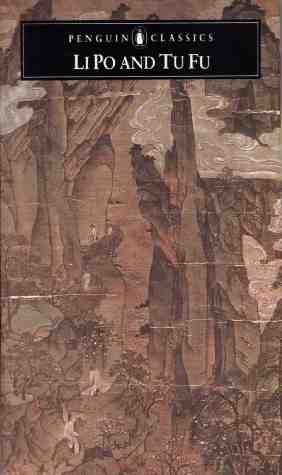Buy from Amazon.com

Arthur Cooper was a wonderfully eccentric, old school, Englishman squarely in the Arthur Waley mould. Born in 1916, his "real job" was as a diplomat; he then retired and produced these translations in the 1970s.
The first hundred pages of the book are taken up by an excellent introduction. This introduces the two poets' lives and works, but also considers their cultural and historical background, the distinctive features of Chinese poetry and the problems which it poses in translation. It is full of perceptive insights, and should prove enjoyable as well as educational for novice and expert alike.
There are 25 poems by Li Bai and 18 by Du Fu, indexed both by title and by first line. Some are accompanied by calligraphic texts in various styles, which are more to be looked at than read. All have notes, which vary in length from a paragraph to several pages. Like the introduction, these are extremely valuable, containing a lot of information on the poems' background, interpretation and translation.
The translations are of variable quality: Cooper strongly advocates the use of natural English rather than what he describes as "half-translation". In some poems this works well; the example discussed below is an unfair choice insofar as it is by some way the worst translation in the volume, but it does give a good illustration of the drawbacks of Cooper's approach.
His version of Chun Wang is as follows:
Looking at the Springtime
In fallen States
hills and streams are found,
Cities have Spring,
grass and leaves abound;
Though at such times
flowers might drop tears,
Parting from mates,
birds have hidden fears:
The beacon fires
have now linked three moons,
Making home news
worth ten thousand coins;
An old grey head
scratched at each mishap
Has dwindling hair,
does not fit its cap!
The most obvious flaw is the use of rhyme; Cooper argues well in the introduction for its occasional use, but this example shows perfectly how its use throughout a work reduces a poem to mere verse. It requires the content (e.g. mishap and cap) to be stretched in order to find rhymes which in any case detract from rather than enhancing the translation.
The looseness of the translation is also due in part to the attempt to follow a consistent metre; "Though" in line three seems to have been inserted purely for this reason, and not only has no basis in the original, but reduces the couplet to nonsense.
Even if all the translations were as poor as this one, I would have no hesitation in recommending this book for the sake of the introduction and notes; in fact many of them are much better than this, and the book is essential reading for anyone with an interest in either poet.
Buy from Amazon.com
